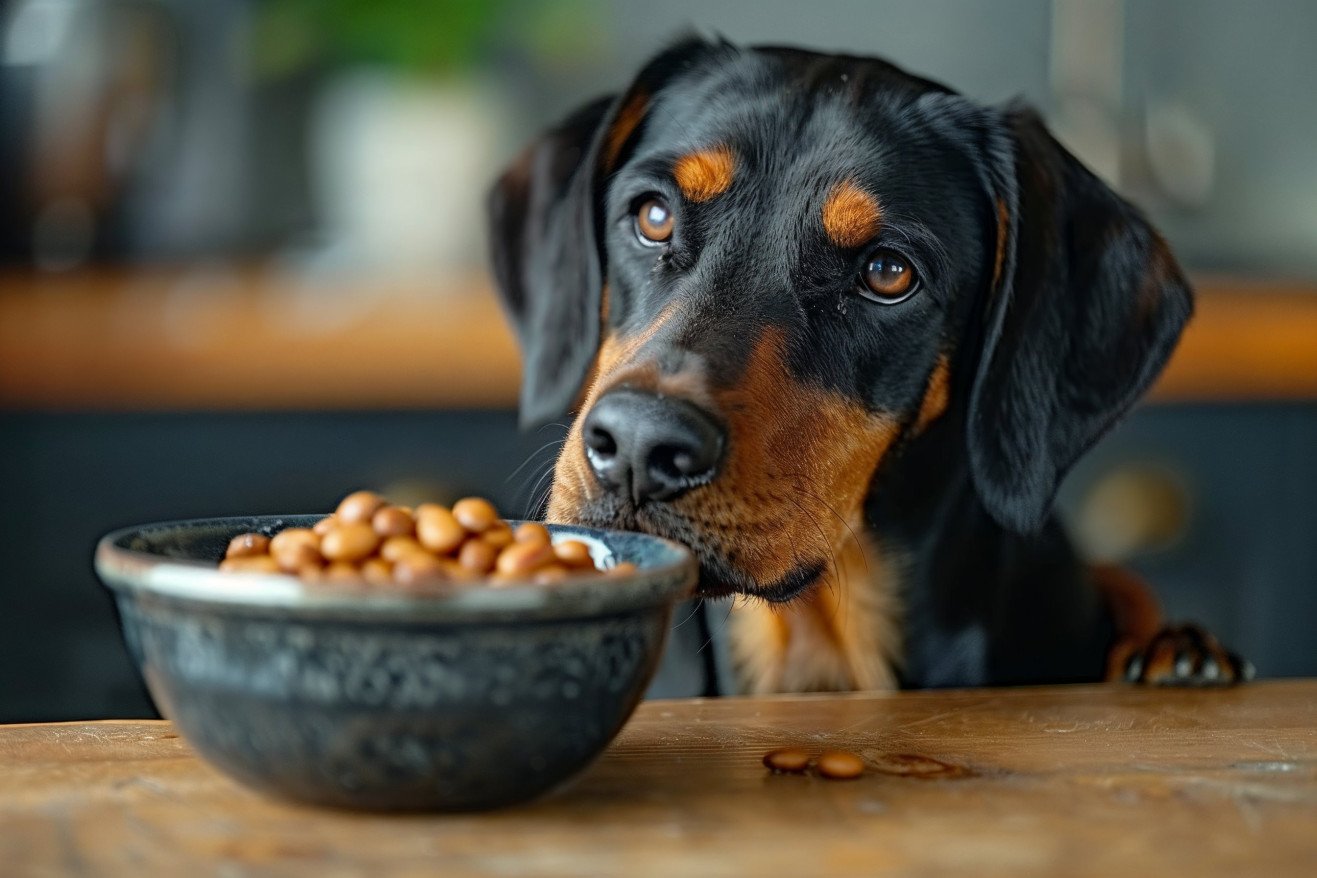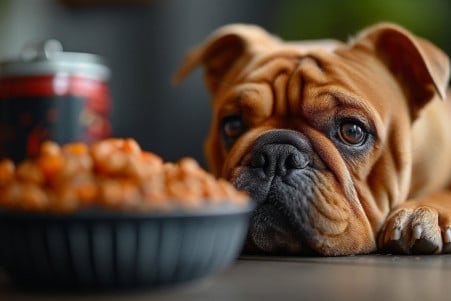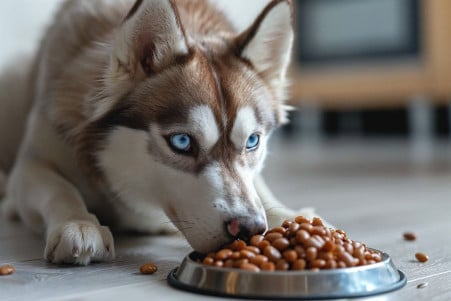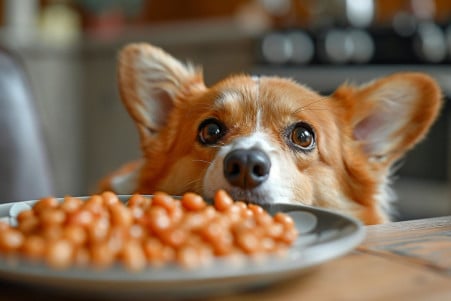Can Dogs Eat Baked Beans? Uncovering the Risks for Your Pet
18 February 2024 • Updated 18 February 2024

While the idea of sharing a meal with your dog is sweet, can dogs have baked beans? Unfortunately, baked beans are not safe for dogs because they contain ingredients like onions, garlic, and high levels of sugar and salt, all of which can cause digestive issues, anemia, and obesity. As a result, it’s best to avoid giving baked beans to your dog.
In order to fully understand the nuances of a healthy diet for dogs, we’ll look at a number of different veterinary papers and nutritional studies. This will help explain why baked beans and the ingredients that are often found in them are bad for dogs.
We’ll also cover some better food options that will help ensure that your dog’s diet is as healthy as possible, providing you with a clear understanding of how to make sure your dog’s diet is as healthy as possible by making informed decisions.
Can dogs eat baked beans?
Feeding Your Furry Friend: What Dogs Need in Their Diet
A dog’s diet is essential to their well-being and should include proteins, fats, and carbohydrates, says VCA Animal Hospitals. Proteins are essential for tissue repair, fats are an energy source and help maintain skin and coat health, and carbohydrates are an important energy source and help maintain gut health.
However, it’s not enough to just provide these nutrients; they must be provided in the right proportions. Feeding an unbalanced diet can lead to nutritional deficiencies or imbalances that can cause everything from skeletal issues to obesity.
The American Association of Feed Control Officials (AAFCO) has established nutritional standards to ensure that commercial pet foods are nutritionally complete and balanced. These standards are used as a reference for pet nutrition and can be trusted by dog owners to make sure their pets are getting the right combination of essential nutrients.
Veterinarians help pet parents choose the best diets for their dogs based on their dog’s breed, life stage, and health status. As PetMD notes, dogs are no longer wolves and need to eat commercial dog food, but a vet can help you sort through the many options to find the best one for your dog.
This is where understanding the basics of nutrition comes in handy, as some human foods, like baked beans, may not meet these standards and could be harmful to your dog.
The Risks of Feeding Dogs Baked Beans
Despite the popularity of baked beans, especially as a side dish at barbecues and picnics, there are several ingredients in this dish that can be harmful to dogs. Onions and garlic, which are often used in baked bean recipes, can cause hemolytic anemia in dogs.
This is a condition where red blood cells are destroyed faster than they can be produced. According to a paper in The Journal of Venomous Animals and Toxins, Allium species, which include onions and garlic, have compounds that cause the formation of Heinz bodies, which in turn cause anemia and its associated symptoms in dogs.
The tomato sauce that is used in baked beans can also be bad for dogs due to its high sugar and salt content. In addition, an experimental study in PubMed found that onion-induced hemolytic anemia in dogs also caused changes in important parameters in their red blood cells, which could affect their ability to transport oxygen and, therefore, their overall health.
The high sugar content, preservatives, and spices that are often found in baked beans are also concerning when it comes to dogs.
These ingredients can lead to kidney and digestive problems, which can cause long-term health issues.
If a dog has ingested any of these harmful ingredients, pet parents should look for signs of illness, including lethargy, vomiting, and loss of appetite, and take them to the vet immediately.
The Dangers of High Sugar and Fat in Dog Food
Dogs that consume high-sugar diets are at a much greater risk of obesity and diabetes, just like humans who consume high-sugar diets. High-fat diets are just as worrisome; a study on PMC found that high-fat diets can change the fecal microbiota in dogs, which can lead to gastrointestinal issues and even diseases like pancreatitis.
The microbiota in the gut needs to be in balance; if it’s not, it can lead to chronic diseases like inflammatory bowel disease.
Moreover, a study from Purdue University found that diets high in oxidized fats, which are found in fried foods, can lead to stunted growth, poor bone development, and a weakened immune system in dogs. These studies show that there are long-term effects of high-sugar and high-fat diets in dogs, including the possibility of earlier onset of age-related diseases and a lower quality of life.
To ensure that your dog is healthy, make sure to read pet food labels carefully and avoid foods that are high in sugar and fat. Opting for a diet that’s well-balanced in terms of nutrients is important to make sure that your dog lives a long and healthy life.
Healthy Beans to Include in Your Dog’s Diet
Although baked beans are not an option for your dog, there are legumes that are both safe and healthy to include in their diet. Black beans, pinto beans, and green beans are all great options that can provide the protein needed for muscle repair and the fiber needed for proper digestion.
As Purina points out, these beans can be a nutritious way to treat your dog, as they also contain a range of vitamins and minerals that can support your dog’s overall health.
That said, it’s important to make sure that these legumes are safe and healthy for dogs, and that means preparing them properly. Rover explains that beans should be cooked without salt or any other seasonings, and that dry beans should be soaked overnight and then cooked until they’re soft to make them easier for dogs to digest and to help reduce the likelihood of gas.
When you’re adding beans to your dog’s diet, make sure to do so thoughtfully and in moderation, making sure that treats don’t account for more than 10 percent of your dog’s daily caloric intake. This will help prevent digestive issues and ensure that your dog’s diet remains balanced.
However, by choosing the right beans and preparing them in the right way, you can add variety to your dog’s diet while helping to keep them healthy and happy.
So, Can Dogs Eat Baked Beans?
To sum it up, baked beans are not safe for dogs to eat due to a variety of factors, including the toxic ingredients onions and garlic, and the high sugar and salt content.
ManyPets notes that onions and garlic can lead to anemia, gastrointestinal issues, and even more serious long-term problems like pancreatitis in dogs. It’s important to know what makes up a healthy and safe diet for dogs, and unfortunately, baked beans don’t make the cut.
However, there are plenty of other legumes and beans that are safe and healthy for dogs, including black beans, green beans, and pinto beans, so there’s no need to put your dog at risk. These options provide important nutrients without the potential dangers of baked beans. Rover’s Janelle Leeson recommends feeding these to dogs in moderation to ensure a balanced diet and avoid digestive issues.
It’s up to us as pet parents to make sure we’re making the best choices for our dogs when it comes to their diet. Always talk to your vet before introducing new foods to your dog, and you can make sure you’re doing your best to keep your dog healthy and happy, and a beloved member of your family, for years to come.


